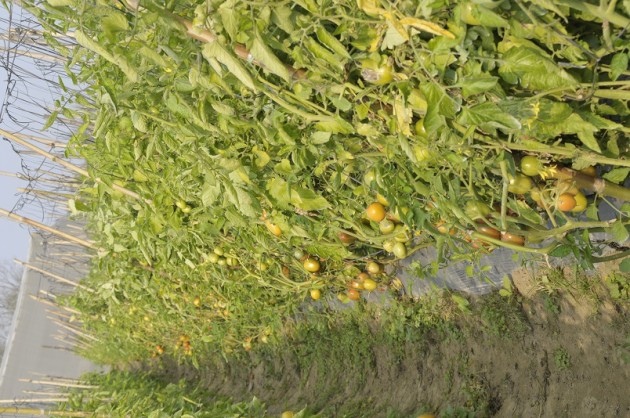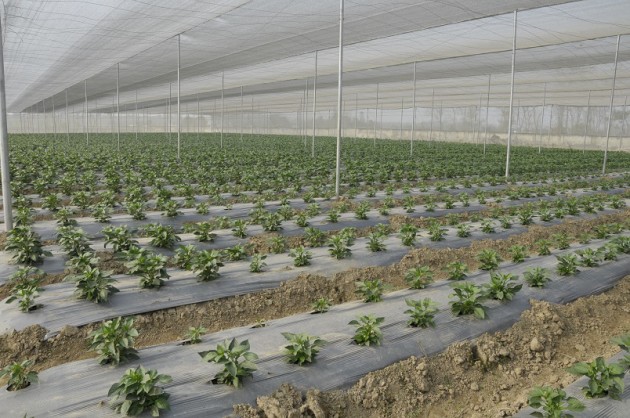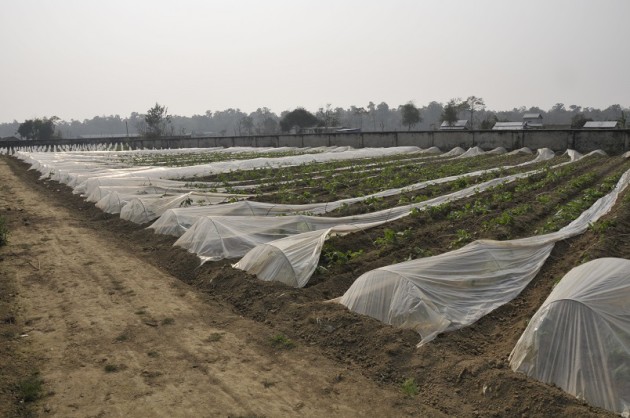PACT supporting to overcome poverty through vegetable farming
 Kathmandu: Nearly six million Nepali youths are abroad mostly in gulf countries in search of employment opportunities and nearly 1500 youths have been leaving the country in search of employment opportunities abroad but there are many untapped potentials in the country. Rather than going abroad for cheap labor work they can make good income at home through vegetable farming. Many youths, who returned from abroad, are being involved in this work with support from different governmental and non-governmental organizations.
Kathmandu: Nearly six million Nepali youths are abroad mostly in gulf countries in search of employment opportunities and nearly 1500 youths have been leaving the country in search of employment opportunities abroad but there are many untapped potentials in the country. Rather than going abroad for cheap labor work they can make good income at home through vegetable farming. Many youths, who returned from abroad, are being involved in this work with support from different governmental and non-governmental organizations.
Nepal has agricultural based economy and we can strengthen the national economy through the development of agricultural sector. Taking this into consideration ‘Project for Agriculture Commercialization and Trade (PACT) is in operation since August 2009 and will continue until June 2018. The Ministry of Agriculture Development (MoAD) has been implementing the project with support from World Bank with the overall objective of improving the competitiveness of smallholder farmers and the agribusiness sector in selected commodity value chains in Project.
To achieve the overall objective the project is:
- helping farmer groups and cooperatives engage in profitable market-oriented production and improved access to markets through the provision of technology and information services and critical public infrastructure and linkages to agribusiness;
- creating and strengthening industry-wide partnerships along the value chain, thus forging linkages between producers, traders, processors, and other stakeholders and;
- reducing existing obstacles to agriculture and food trade thereby increasing the ability of farmers and agribusiness to respond to Sanitary and Phytosanitory (SPS) measures and food-quality standards to meet domestic and international market requirements.
Scenario of Vegetable Farming:
As per National Census of Agriculture 2011-2012, Nepal currently produces 22 tons of vegetable every year from 245 hector of land. Similarly, the Vegetable Crops Survey of Nepal 2009-10 states that Nepal currently produces vegetables worth 45 billion rupees (approx. USD 441,176,479) per year. Similarly, the survey adds that nearly 70 percent households are involved in vegetable farming in any way and investing 9 billion rupees (approx. USD 85,714,285) per year for vegetable farming.
As per the latest survey, 1.96 million ton vegetable is being produced in tarai through 137 hector of land, while 1.24 million ton vegetable is being produced in hilly region followed by 115 thousand ton vegetable in the mountain region. According to the survey, of the total produce farmers consume 40 percent and remaining 60 percent is being sold for income. Of the total farmers involved in vegetable farming only 18 percent have been involved in commercial vegetable farming. Cauliflower is the most sold vegetable of Nepal followed by tomato and cabbage.
Although there is high potential of producing vegetable in tarai region, people of hilly region are making more income from vegetable farming as the rate of vegetable is quiet low in this region due to penetration of vegetable from India, which is produced in low cost due to subsidy provided by the government. Despite having more potential of vegetable, only negligible number of farmers have been using organic farming by using organic fertilizer. It is estimated that only eight percent farmers have been involved in organic farming.
Vegetable farming could be a good source of income for small farmers as they can earn more money from vegetable farming as compared to stable food production. There is good prospect of exporting Nepali vegetables if farmers reduce the use of chemical fertilizer and adopt modern farming techniques. There is good prospect of earning money from off seasonal vegetable farming as Nepal has good climatic variation. The vegetable survey has indicated that a person can make a profit of NPR 100 thousand to 125 thousand (approx. USD 950 to 1,190) from the vegetable farming in one hector of land. The off seasonal vegetable can be exported to Bangladesh and Tibet autonomous region of China as these countries have huge demand of vegetable.
Technical and Institutional Provisions:
Vegetable Development Directorate of the Ministry of Agriculture has been playing the leading role for the development of vegetable farming in Nepal. Similarly, Crop Research Department of the National Agricultural Research Council is another government mechanism facilitating the vegetable farming. Similarly, District Agricultural Office and other International and national non-governmental organizations have also been supporting farmers in this regard. These organizations have been providing technical and material support for farmers to be engaged in commercial vegetable production. Thanks to all these efforts many fallow land including the riverbed have been turning into greenery and also contributing for additional income to the farmers.
Challenges and ways to overcome it:
The main challenge for off seasonal vegetable farming is the use of chemical goods like the fertilizer and pesticides, which have been decreasing the quality of our agricultural products. For example Kapurkot area of Salyan District is considered as pocket area for tomato farming but the tomato produced in this area could not sustain more than five days only due to over use of chemical fertilizer. Similarly, the taste of tomato is also not good due to the fertilizer. As the farmers have been using more chemical fertilizer, it is reducing the taste of vegetable and also having adverse impact in the human health. Similarly, another challenge is management of agricultural produce during post harvesting period. Farmers have been compelled to sale their products in low price as there is no proper collection and storage center.
 If the use of chemical fertilizer and pesticide was reduced in off-seasonal vegetable farming, it will contribute for poverty reduction through export of off seasonal vegetable farming.
If the use of chemical fertilizer and pesticide was reduced in off-seasonal vegetable farming, it will contribute for poverty reduction through export of off seasonal vegetable farming.
Role of PACT Project:
The PACT project has been extending supplementary financial support to both seasonal and off-seasonal vegetable farming. The project implemented with support from the World Bank has been supporting for commercial vegetable farming in the districts where there is irrigation facility and road network. To receive support from the project, the farmer’s group or agricultural cooperative, vegetable processing farm or entrepreneurs involved in transaction of agricultural inputs have to do vegetable farming in five hector of land in the case of tarai; two and half hector of land in the case of hill and one and half hector land in the case of Kathmandu valley. The project supports for making infrastructure for vegetable farming like irrigation, construction of tunnel, construction of poly-house and market center. The project also supports upto 30 percent for purchasing vehicle for transporting agricultural inputs and goods. It also supports for making collection point, purchasing grading and packaging machine, organic fertilizer and pesticide. Similarly, the project also supports for different trainings and also for developing network with the market.
(Editor’s Note: In this section, we highlight the contribution made by development partners in Nepal’s development. How do you find this write-up, please send your comment at editor@nepalekhabar.com. Similarly, if you think your organization has also made significant contribution in any sector of the society please write to us at the email address above, we will feature the role your organization played in the particular sector)

